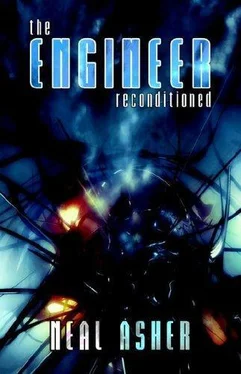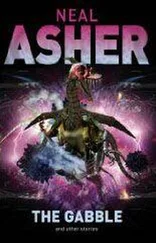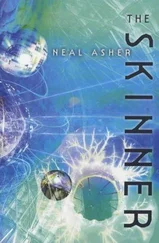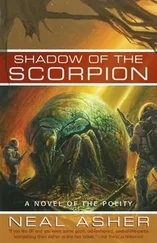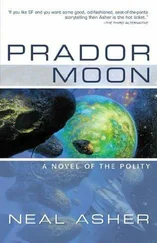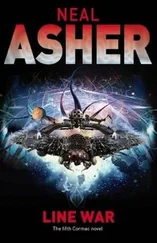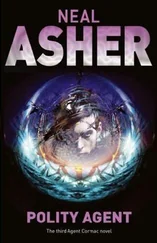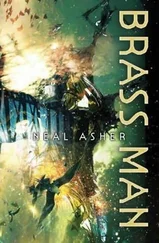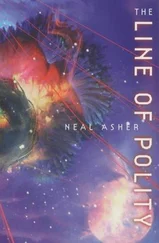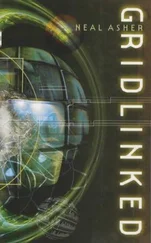Neal Asher - The Engineer Reconditioned
Здесь есть возможность читать онлайн «Neal Asher - The Engineer Reconditioned» весь текст электронной книги совершенно бесплатно (целиком полную версию без сокращений). В некоторых случаях можно слушать аудио, скачать через торрент в формате fb2 и присутствует краткое содержание. Год выпуска: 2006, ISBN: 2006, Издательство: Cosmos Books (PA), Жанр: Фантастика и фэнтези, на английском языке. Описание произведения, (предисловие) а так же отзывы посетителей доступны на портале библиотеки ЛибКат.
- Название:The Engineer Reconditioned
- Автор:
- Издательство:Cosmos Books (PA)
- Жанр:
- Год:2006
- ISBN:9780809556762
- Рейтинг книги:5 / 5. Голосов: 1
-
Избранное:Добавить в избранное
- Отзывы:
-
Ваша оценка:
- 100
- 1
- 2
- 3
- 4
- 5
The Engineer Reconditioned: краткое содержание, описание и аннотация
Предлагаем к чтению аннотацию, описание, краткое содержание или предисловие (зависит от того, что написал сам автор книги «The Engineer Reconditioned»). Если вы не нашли необходимую информацию о книге — напишите в комментариях, мы постараемся отыскать её.
,
,
,
,
and
.
The Engineer Reconditioned — читать онлайн бесплатно полную книгу (весь текст) целиком
Ниже представлен текст книги, разбитый по страницам. Система сохранения места последней прочитанной страницы, позволяет с удобством читать онлайн бесплатно книгу «The Engineer Reconditioned», без необходимости каждый раз заново искать на чём Вы остановились. Поставьте закладку, и сможете в любой момент перейти на страницу, на которой закончили чтение.
Интервал:
Закладка:
“The machine is drawing in and circulating water,” said Box. No need to confirm. They could see the movement. They watched as it drew in shrimps and water plants. Only water came out.
“It’s making something quite big now,” said Abaron.
“Oh really,” said Chapra, her hands rattling over her console. She swore under her breath when she realised Box was still not allowing her to scan the machine, then she abruptly folded her arms and sat back.
The machine expanded until it was four metres across, the top of it out of the water, the mouths of the tubes three quarters of a metre across. In a couple of the tubes they could see flickers of light as from an undersea welder. It drew in some of the bigger crustaceans. They did not come out again.
“Looks like it’s getting there,” said Abaron.
The Jain reached inside one of the tubes, pulled out something bulky, a soft mollusc from its shell. It towed this object to the jetty, and with much effort heaved it up out of the water.
“Oh my God,” said Abaron.
On the jetty lay a female human child of perhaps five years. At the base of her back, etched in the purples and reds of a birth mark, was the triangular interface. As they watched the child vomited water then slowly stood up. Her skin was very red.
“The heat,” said Chapra.
The door to the lock opened and Judd strode into the chamber.
The Jubilan communications satellite was a confetti of bright metal wrapped around a silver ovoid half a kilometre across. Geostationary above Jubal it glittered like some huge Christmas decoration. Around it, like a swarm of silver bees, glinted shuttle craft and loaders. The dark wedge of the Samurai was in harsh contrast as it slid into realspace trailing streamers of red fire. From this wedge of night sped four hardly visible specks at slow relativistic speeds. Two fell on the satellite. One wavered, then was gone in a galaxy-shaped explosion. The other struck home and the bright satellite cracked open, jetting flame and human and mechanical debris. The satellite came apart in the horrible silence of vacuum. The only screams heard were over radio links, and brief.
Kellor watched the destruction with no visible sign of emotion, but he had reservations: there were always extras. He had expected no less. But this was a Polity world. The extra payment of five million was all that had swayed him. He turned his attention to the display showing the other two missiles dropping towards the planet.
“What did they use?” he asked Jurens.
Jurens glanced up from his console. “Pulsed laser. Pretty powerful. They won’t have that in atmosphere and anyway, the missiles have learnt.”
Kellor noted Conard’s disgusted expression and dismissed it. The display showed the missiles dropping to a mountain range a hundred kilometres from their target. They’d go in ten metres above the ground. There was only one weapon that could get through their shields and armour. Kellor smiled to himself as he watched them close in like hunting wolves. Then his smile dropped away as the two missiles blinked out of existence.
One weapon …
“Jurens! Get us out of here! Now!”
“Wait!” shouted Conard. “The runcible!”
Jurens ignored Conard, hit the ionic boosters, then poised his hand over the controls for the U-space engines. The Samurai was at a quarter C but it needed just a little more. Kellor slammed his hand down on Juren’s hand, and the ship dropped into U-space. It was a slow drag, the ship straining and the sounds of distorting metal reaching them on the bridge. Over one of the coms someone began screaming as they saw through an incomplete field into the infinite. Kellor felt something dragging at him, at the ship, and it was not the result of a too-quick entry into U-space. When the drag ceased, he allowed himself a grimace at the sweat he felt on his top lip and turned to face Conard’s raging. The General was severely pissed-off. He was glaring and unconsciously clenching and unclenching his hands. His two aides stood quiet in the background. A surreptitious scan had showed them both to be heavily armed. Automatics in the bridge covered them, and Jurens and Speck had weapons to hand. If the General started anything Kellor would finish it. There was no way the man could call on his other forces here. They were all sitting in their gunships which, with an order, Kellor could dump into deep space.
“They did not seem to me the smartest of missiles,” hissed the General.
“Get to the point.”
“You should have used a human team. AIs are not reliable.”
The sheer idiocy of that comment left Kellor without any reply. How could you argue with that?
Conard went on, “Humans are chosen of God and are the only ones with the right to sentience!” Oh dear, it got worse and worse. Kellor considered killing him right then and there. It seemed the only kind thing to do. The problem was that Conard had a source of information. Kellor wanted that source before he killed the man.
“The missile did not strike home because the facility was protected by ground-based singuns. Your entire force would not have got through and if I had taken the Samurai in any closer, they would have gutted it.”
Conard stood there still clenching and unclenching his hands. After an embarrassingly long time he seemed to get control of himself. He turned and strode out of the bridge. That’s it , thought Kellor, go and kick shit out of one of your subordinates ,
PART FOUR
The sifting machine had, in strips, methodically sifted a tenth of the desert’s surface to a depth of one metre. At a pace of two kilometres per hour it sucked up the sand, passed it through various grids and sieves, and spat it out behind filling the trench it had made. The sand left behind the machine was level. This would last until the next earthquake or storm. One of either usually came along each day. The process was crude and frowned upon by many archaeologists who claimed that valuable artefacts could be damaged or destroyed. Alexion Smith took the view that anything surviving five million years in that desert would not be damaged by the sifter. His robust approach to archaeology was greatly disliked. But he got results.
Smith checked the sifter every planetary day — about four solstan days — and made a find on average once every solstan year. Mostly he came to empty out strange-shaped stones and package artefacts from more recent ages for transmission to associates. On this occasion he had a find. In the red light of the giant sun the coralline material was the colour of old blood. Under the lamps it would be pink and Smith knew where he had seen its like before. The excitement he might have felt before was lacking now. Years of research and now, out there, a real living Jain. Smith glanced up at the red sun and the psuedobirds. A shape was coming towards him and it wasn’t a bird. The crab drone landed on the cowling of the sifter with a clattering and scrabbling and once it got its balance it peered at him with stalked eyes.
“Who are you then?” asked Smith.
“I am the Cable Hogue ,” said the drone in a gravelly voice.
“Interesting name.”
“I am a ship AI speaking to you through this drone. The drone is called CH143 though it sometimes calls itself Spider.”
“It has an independent mind then?”
“Yes.”
“Well… what do you want of me?”
“Your expertise.”
“Go on.”
“To advise on matters Jain.”
Smith dropped the fragment of ancient Jain technology back into the collection box of the sifter.
“I’ll come,” he said.
The drone rose from the cowling.
“You have four hours to get to the runcible here. Go to the Vorstra moon for short range transference to the Cable Hogue .”
Читать дальшеИнтервал:
Закладка:
Похожие книги на «The Engineer Reconditioned»
Представляем Вашему вниманию похожие книги на «The Engineer Reconditioned» списком для выбора. Мы отобрали схожую по названию и смыслу литературу в надежде предоставить читателям больше вариантов отыскать новые, интересные, ещё непрочитанные произведения.
Обсуждение, отзывы о книге «The Engineer Reconditioned» и просто собственные мнения читателей. Оставьте ваши комментарии, напишите, что Вы думаете о произведении, его смысле или главных героях. Укажите что конкретно понравилось, а что нет, и почему Вы так считаете.
